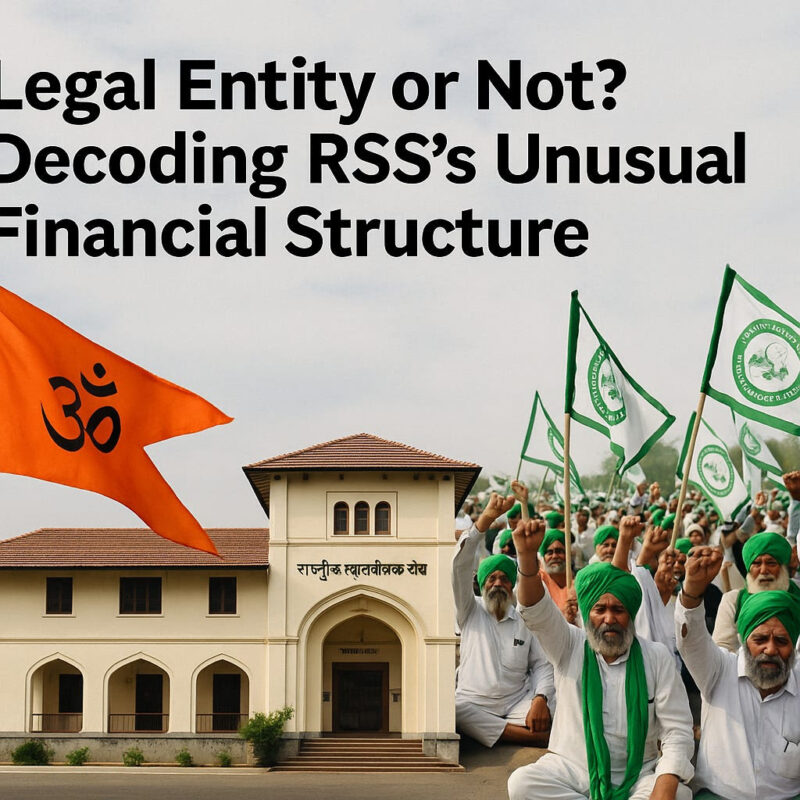
“Legal Entity or Not? Decoding RSS’s Unusual Financial Structure” encapsulates a significant aspect of India’s socio-political landscape, highlighting how prominent movements operate with decentralised organisational models without formal legal structures or central bank accounts. Organisations like the Rashtriya Swayamsevak Sangh (RSS), India Against Corruption (IAC), and Samyukta Kisan Morcha (SKM) illustrate this phenomenon. Operating through loosely networked affiliates or grassroots units, these organisations effectively navigate the complexities of legal regulation and financial transparency.
Case Study: Rashtriya Swayamsevak Sangh (RSS)
Founded in 1925, the RSS exemplifies decentralised structuring. It is not registered as a single legal entity, nor does it operate a central bank account. Its finances are managed independently by thousands of local units (shakhas) and affiliated entities. Despite its informal status, the RSS has significantly influenced Indian politics and society. However, this structure has also invited controversy, notably regarding transparency and accountability.
Interestingly, despite lacking formal registration, the RSS has been banned at least three times since India’s independence (in 1948, 1975, and 1992). Each ban highlighted the inherent challenges of regulation, given the RSS’s decentralised nature.
The IAC Movement: Informal Yet Influential
India Against Corruption (2011–2012), spearheaded by activists like Anna Hazare and Arvind Kejriwal, similarly operated without formal registration. Financial contributions flowed through affiliated NGOs such as the Public Cause Research Foundation. While this allowed for rapid mobilisation and flexibility, it also drew criticism for its opaque financial practices and limited accountability mechanisms, leading to public skepticism.
Samyukta Kisan Morcha (SKM): A Coalition Model
Established during the farmer protests against agricultural reforms in 2020, SKM represents another decentralised structure comprising over forty independently registered farm unions. Each union autonomously manages its finances and activities, without a centralised legal or financial framework. While effective in maintaining grassroots authenticity and non-political neutrality, SKM has faced occasional criticism for transparency concerns at the constituent union level.
Tax Implications Under the Income Tax Act, 1961
Examining objectively and dispassionately, a critical legal question emerges regarding organisations lacking formal charitable status or registration. Under the Income Tax Act, 1961, entities operating informally might qualify as an “Association of Persons” (AOP), making them potentially taxable unless explicitly exempted. The Act defines an AOP as a collective entity comprising individuals joining together for a common purpose, whether formally structured or not. Therefore, decentralised entities such as RSS, IAC, and SKM, operating without formal charitable status or statutory exemptions, could theoretically fall under the tax net. This possibility necessitates clarity from taxation authorities to avoid ambiguities and unintended non-compliance.
Advantages of Decentralised Structures
Decentralisation offers significant advantages, including agility in decision-making, resilience against political pressures, and empowering grassroots leadership. Organisations like RSS, IAC, and SKM have utilised these benefits to galvanise public opinion swiftly, bypassing bureaucratic inertia and strict regulatory scrutiny.
Potential Risks and Disadvantages
However, the absence of formal legal status and transparent financial structures poses considerable risks. These include vulnerability to misuse of funds, limited financial accountability, and challenges for regulatory oversight. Decentralised structures can inadvertently facilitate opacity, thus undermining public trust and inviting governmental suspicion or action, as evidenced by the periodic bans imposed on RSS.
संघ प्रमुख मोहन भागवत बैंकॉक में वर्ल्ड हिंदू कांग्रेस में शामिल होने पहुंचे हैं। उन्होंने अंग्रेजों का नाम लिए बगैर कहा- हमने 250 साल धन विजय का अनुभव किया। – Dainik Bhaskar
Recommendations for Enhanced Transparency and Accountability
To mitigate these inherent issues, decentralised organisations should proactively adopt internal accountability frameworks. Suggested improvements include:
Mandatory disclosure of audited financial statements by constituent units.
Creation of internal oversight bodies to ensure ethical governance.
Periodic public reporting of key activities and financial operations.
Voluntary registration of core entities or coordination committees to enhance legitimacy.
Summing Up: Balancing Flexibility and Transparency
Decentralised organisations undeniably play an influential role in India’s socio-political landscape. However, maintaining public trust necessitates balancing their inherent flexibility and resilience with transparency and accountability. Strategic internal reforms and voluntary compliance with transparent governance practices could significantly improve the effectiveness and reputation of these organisations, reducing the risk of future controversies or governmental interventions.
Author Credentials:
Karan Bir Singh Sidhu, IAS (Retd.), 37 years in IAS, former Special Chief Secretary, Punjab. Writes at the intersection of political reality, legal entities, and financial propriety.